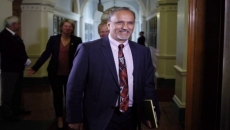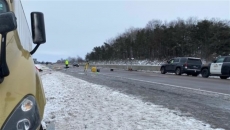OTTAWA - Canada's first Indigenous Governor General, within months of being appointed to the role, requested government officials outline what departments were doing to allow First Nations to move away from the Indian Act.
Mary Simon, an Inuk leader, diplomat and negotiator, was sworn in last July as the country's 30th Governor General.
Her appointment as the first Indigenous person to the office made history, and came at a time when Indigenous and non-Indigenous communities were reeling from the discovery of hundreds of unmarked graves at former residential school sites.
Simon, who was born in Kangiqsualujjuaq, in the Nunavik region of northern Quebec, made advancing the country's reconciliation with Indigenous Peoples a priority.
A glimpse at what that looks like behind the closed doors of Rideau Hall was recently revealed in documents released to The Canadian Press under federal access to information legislation.
Briefing notes show Simon met with the deputy minister of Crown-Indigenous Relations last August to discuss what role she could play "in Indigenous issues and reconciliation as a whole."
Another meeting took place that October between Simon and the same deputy minister as well as the deputy minister of Indigenous Services Canada to discuss the Indian Act.
"The Governor General is interested in being updated on the important work underway … with respect to the Indian Act," reads a briefing note prepared for one of the officials.
"Specifically, how (departments) are providing opportunities for First Nations to succeed within the legislation, or to move away from it partially or fully."
Although most Canadians see a governor general, who serves as the Queen's representative, as playing a largely ceremonial role and needing to attend a variety of public events, they can also exert "soft influence," said Carleton University professor and parliamentary expert Philippe Lagassé.
"Not everybody just wants to be a potted plant," he said.
"Behind closed doors, if a viceregal representative wants to push ministers, deputy ministers, first ministers on something, they're certainly within their rights to do so — that's part of the job."
What Simon may have had to say about the Indian Act — which Prime Minister Justin Trudeau has stated he wants to see end as Indigenous leaders have long panned it as being colonial and paternalistic — will remain a secret, given the nature of the office.
"In keeping with their non-partisan role, governors general do not comment on legislation," Rideau Hall spokeswoman Ciara Trudeau said in an email.
"It is not in our practice to share details of private meetings."
She added that Simon regularly meets with those inside of government and out to discuss her priorities, which include reconciliation, climate change, youth and mental health.
In terms of what Crown-Indigenous Relations officials feel a governor general can do to advance reconciliation, the briefing note says they can bring Indigenous and non-Indigenous people together.
"The Governor General fulfils this responsibility by visiting First Nations, Inuit and Métis communities across Canada; by celebrating Indigenous achievements and milestones alongside those of non-Indigenous Canadians; and by drawing attention to the contributions of Indigenous Peoples throughout Canadian history," it reads.
An accompanying presentation prepared for the October meeting with Simon includes an overview of the past attempts to reform the Indian Act, as well as the challenges faced by First Nations wanting to move away from it and the establishment of modern treaties and self-government agreements.
Dalhousie University law professor Naiomi Metallic, who is Mi’kmaq and an expert in Indigenous law and policy, notes that Simon, being Inuk, "would have grown up under a different set of colonial circumstances that were slightly different from the Indian Act."






